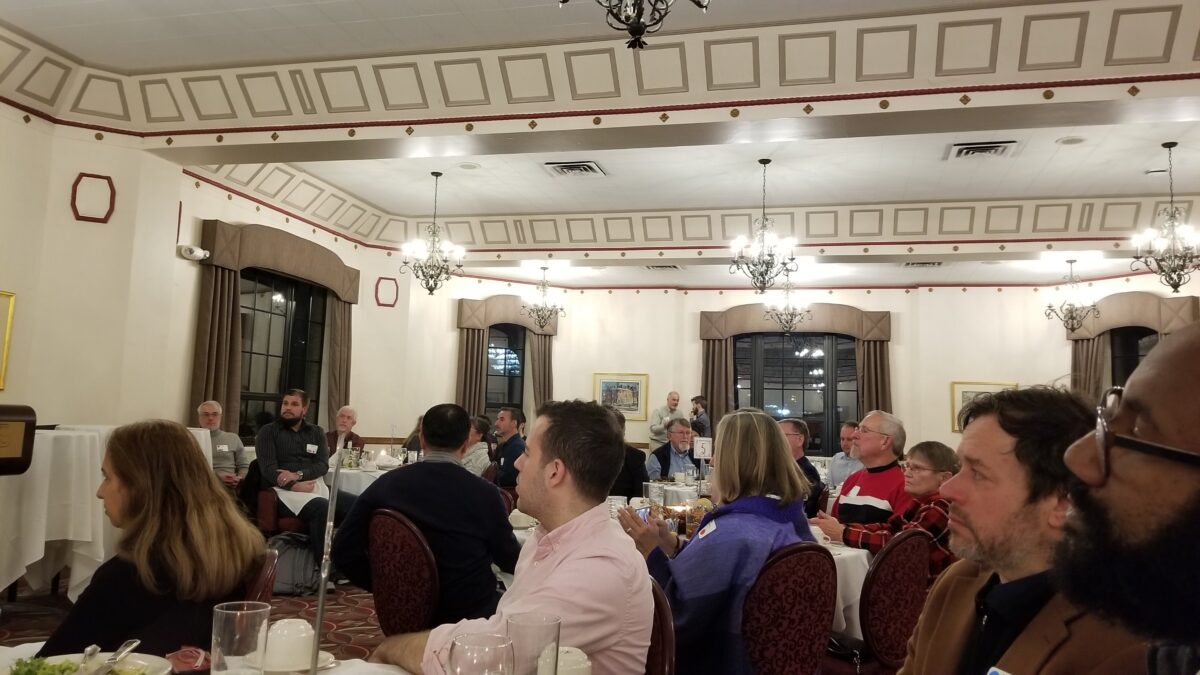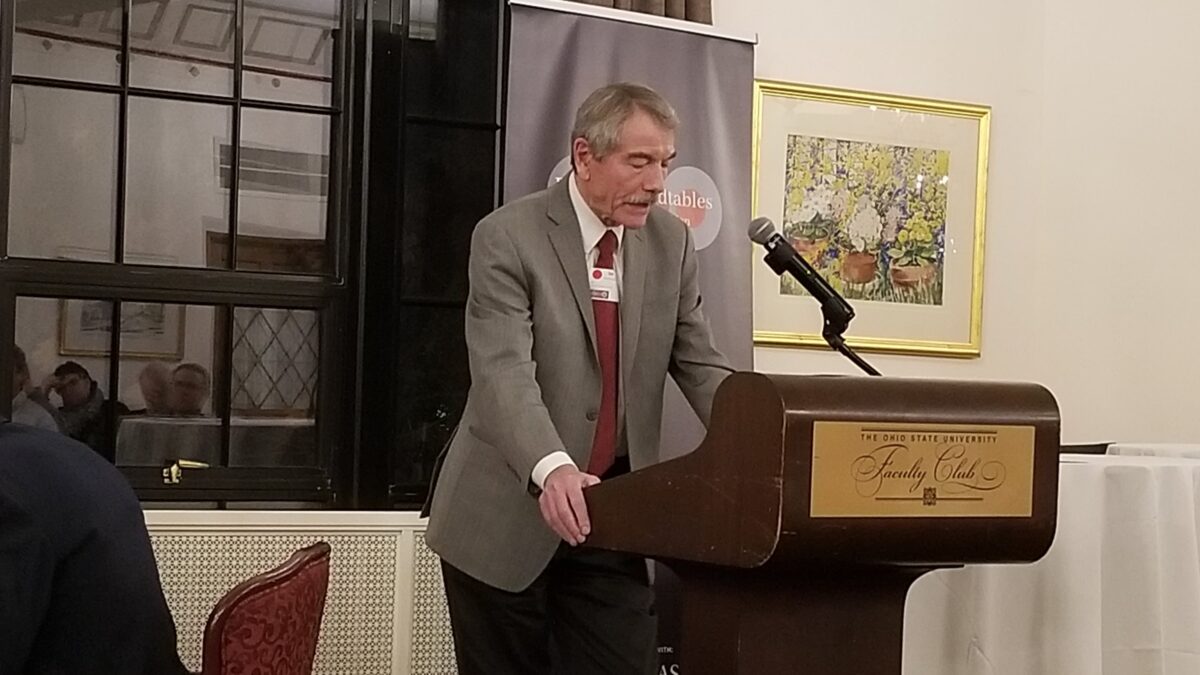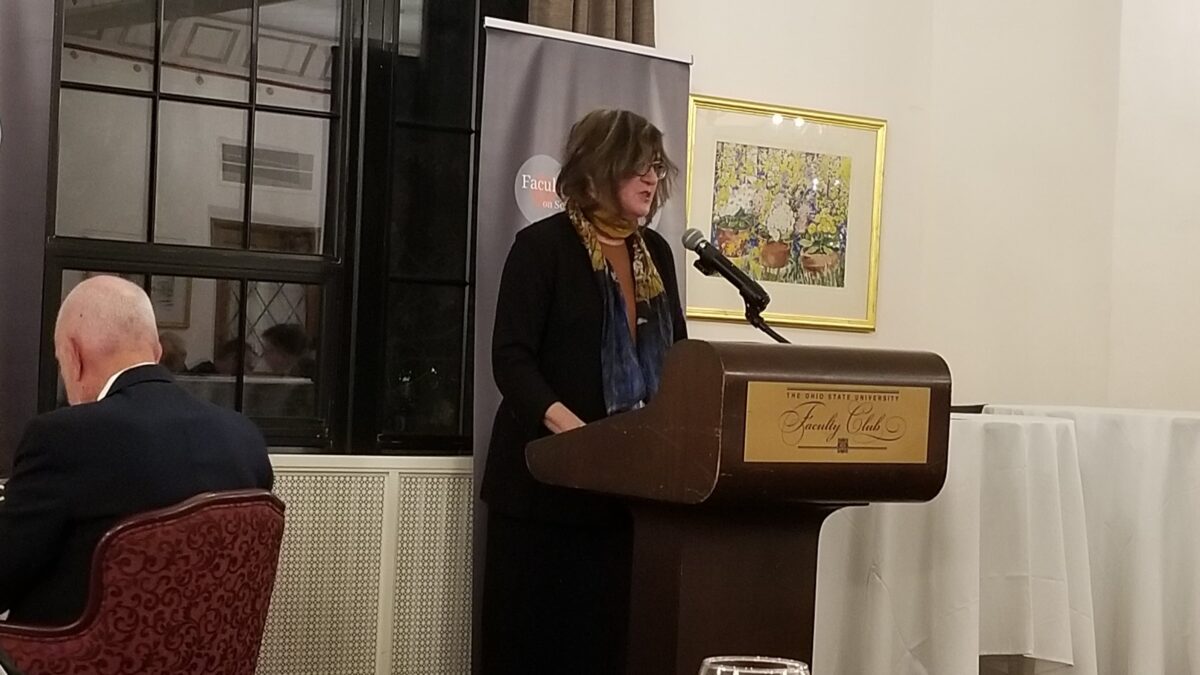
Imagine an evening beginning with drinks and appetizers and a dinner with people around the table of diverse disciplinary and religious backgrounds. Imagine courteous but substantive dialogue between two presenters from different faith stances, and extended time for conversation and questions around tables. And then extra time to talk with presenters over more refreshments afterwards. Does that even sound possible? It was, recently, when over 100 university faculty from The Ohio State University and neighboring campuses gathered on a chilly fall evening at Ohio State’s Faculty Club.
The topic of the night was “Is There Knowledge beyond Science? Exploring the Relationship between Scientific & Religious Knowledge.” The evening’s presenters were Ian Hutchinson, professor of Nuclear Science and Engineering and part of the Plasma Science and Fusion Center at the Massachusetts Institute of Technology, and Tamar Radavsky, a professor of ancient and medieval philosophy with a focus on Jewish and Islamic philosophy at The Ohio State University.

Dr. Hutchinson distinguished between science as a methodology of the natural sciences focused on reproducibility and descriptive clarity, scientia, referring to knowledge more broadly and “scientism,” which dismisses as irrational that which cannot be proven scientifically, including religious truth claims. Hutchinson observed that this precluded many lines of enquiry, including historical knowledge, on which the Christian claim of the resurrection is based, and that in fact, the assertion that the only way of rational knowing is through science cannot itself be scientifically proven. He observed that there are many aspects of life on which we act “by faith” on less than scientifically demonstrable evidence including love in marriage and verdicts in our justice system.

Dr. Radavsky spoke from her area of Jewish philosophy, observing that the conversation about religion and science is often really just about Christianity and science and needs to be broadened to religions and science. Citing the work of Ian Barbour, she noted three classical ways the two had interacted: Conflict (the Draper/White thesis), Independence (as in Stephen J. Gould’s non-overlapping magisteria), and Dialogue and Integration, where one “must strive to make his theology and cosmology consonant (McMullen). At one point she discussed her own belief in truth, contra many of her students. She described writing the statement on her chalkboard: “God raised Jesus from the dead” and stated, “That statement is either true or it isn’t,” and the discomfort of students that followed. While she would not affirm the truth of the statement, she said that what one believed about this said much about who they were.
We then transitioned to table discussions. One table participant described their table this way:
We had 2 Jewish agnostics, 2 Chinese Christians, one a recent convert, a Pakistani Muslim, an anti western religion Bolivian, a German microbiology atheist and me. 4 of 8 from our table made it down for the after party downstairs but conversations were great.
For many of our tables, the first question we discussed, “What was your worldview growing up and what is it now?” was the most illuminating of the evening. People at our table, with a diverse mix, appreciated the diversity, and especially hearing each other’s religious journeys. They recognized both differences and places of commonality. Several noted how they wished there were more opportunity for such conversation. We also had to generate a question for our presenters. One that naturally arose from the sharing of different perspectives was “how can we facilitate more conversations about religion and science in our classes?”
One of the most striking comments from participants in a follow-up survey was “I have generally tried to separate my academic and personal life… but I’m really thinking I don’t need to do that.” Another left thinking further about this question, “How do we engage more in civil, intentional, authentic discussions with others having diverse worldviews?” One faculty member wrote: “I am looking to build a Religion course on Religion and Science and I plan to follow up with Dr. Tamar Rudavsky on the course she created as well as look at her book on Jewish Philosophy in middle ages as a possible resource for me in planning the course.” Dr. Hutchinson’s discussion of scientism spoke to another participant: “Understanding the effect of Scientism, and its associated presuppositions, on academia and society in general.”
The John Templeton Foundation sponsored the evening, part of a funding grant for similar religion and science Faculty Roundtables across the country. At Ohio State, a local faculty team planned, organized, and invited guests to the event, facilitated by InterVarsity faculty minister Howard Van Cleave.
Bob Trube is Associate Director of Faculty Ministry and Director of the Emerging Scholars Network. He blogs on books regularly at bobonbooks.com. He resides in Columbus, Ohio, with Marilyn and enjoys reading, gardening, choral singing, and plein air painting.

I was a faculty participant. It was fabulous!